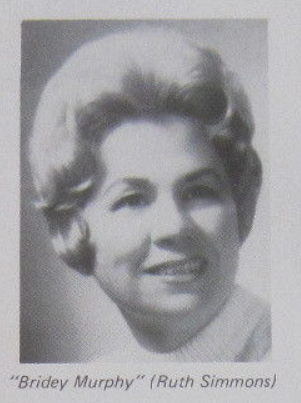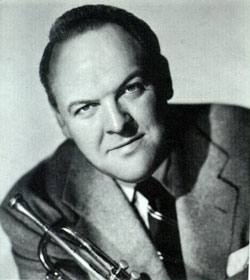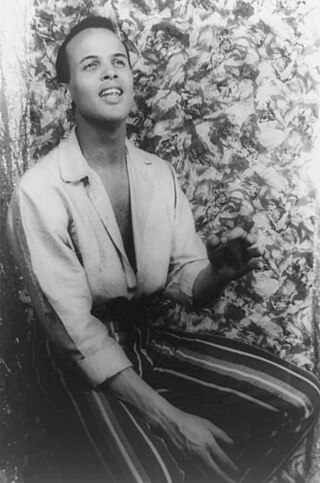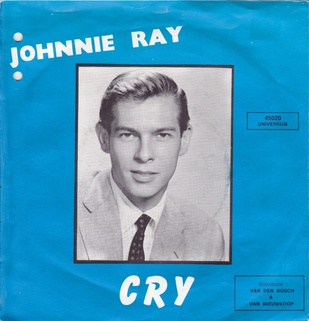
Lawrence Welk was an American accordionist, bandleader, and television impresario, who hosted The Lawrence Welk Show from 1951 to 1982. His style came to be known as "champagne music" to his radio, television, and live-performance audiences.

Gerald David "Lorenzo" Music was an American actor, producer and writer. Music began his career in the late 1960s as a writer and a regular performer on the controversial CBS variety show The Smothers Brothers Comedy Hour. In the 1970s, Music co-created the sitcom The Bob Newhart Show with David Davis and composed its theme music with his wife, Henrietta. He also wrote episodes for The Mary Tyler Moore Show and Rhoda, and got his major voiceover role for playing the unseen, but often heard, Carlton the Doorman in Rhoda. Music gained fame in the 1980s for voicing Jim Davis' comic strip character Garfield on twelve animated specials, and later in cartoons, video games, and commercials until his death in 2001. Music's distinctive voice of Garfield is still often used in animated specials in his legacy.

Bridey Murphy is a purported 19th-century Irishwoman whom U.S. housewife Virginia Tighe claimed to be in a past life. The case was investigated by researchers and concluded to be the result of cryptomnesia.

Stan Freberg was an American actor, author, comedian, musician, radio personality, puppeteer and advertising creative director.

Charles Dawson Butler, professionally known as Daws Butler, was an American voice actor. He worked mostly for the Hanna-Barbera animation production company, where he originated the voices of many familiar characters, including Yogi Bear, Huckleberry Hound, Snagglepuss, Auggie Doggie, Loopy De Loop, Wally Gator, Quick Draw McGraw and Baba Looey, Snooper and Blabber, Hokey Wolf, Elroy Jetson, Peter Potamus, The Funky Phantom and Hair Bear.

Edward William May Jr. was an American composer, arranger and trumpeter. He composed film and television music for The Green Hornet (1966), The Mod Squad (1968), Batman, and Naked City (1960). He collaborated on films such as Pennies from Heaven (1981), and orchestrated Cocoon, and Cocoon: The Return, among others.
The Stan Freberg Show was a weekly radio comedy show that ran on the CBS Radio Network for fifteen episodes in 1957 from July 14 through October 20. The show, starring comedian Stan Freberg and featuring the vocal talents of Daws Butler, June Foray and Peter Leeds, Peggy Taylor as the resident singer, and the musical direction of Billy May. The show aired in the 7:30 p.m. (ET) time slot following repeats of The Jack Benny Program {"The Best Of Benny"} on Sundays. The show was produced by Pete Barnum.

"St. George and the Dragonet" is a short audio satire recorded August 26, 1953 by Stan Freberg for Capitol Records. It was released September 21, 1953 as a 45 rpm single, and reached No. 1 on both the Billboard and Cash Box record charts.

Donavan Freberg is an American photographer, advertising creative, voice actor, and writer.

"Day-O " is a traditional Jamaican folk song. The song has mento influences, but it is commonly classified as an example of the better known calypso music.

"Cry" is a 1951 popular song written by Churchill Kohlman. The song was first recorded by Ruth Casey on the Cadillac label. The biggest hit version was recorded in New York City by Johnnie Ray and The Four Lads on October 16, 1951. Singer Ronnie Dove also had a big hit with the song in 1966.
In the United States, commercial radio stations make most of their revenue by selling airtime to be used for running radio advertisements. These advertisements are the result of a business or a service providing a valuable consideration, usually money, in exchange for the station airing their commercial or mentioning them on air. The most common advertisements are "spot commercials", which normally last for no more than one minute, and longer programs, commonly running up to one hour, known as "informercials".

Time for Beany is an American children's television series, with puppets for characters, which was broadcast locally in Los Angeles starting on February 28, 1949 and nationally by the improvised Paramount Television Network from 1950 to 1955. It was created by animator Bob Clampett, who later reused its main characters for the animated series Beany and Cecil. The show won three Primetime Emmy Awards for best children's show.

Stan Freberg Presents the United States of America Volume One: The Early Years is a 1961 American comedy album with music and dialogue written by Stan Freberg, released as Capitol W/SW-1573 in 1961. Freberg satirizes episodes of the history of the United States from 1492 until the end of the Revolutionary War in 1783. The album combined dialogue and song in a musical theater format. Billy May orchestrated and conducted the music, with the Jud Conlon Singers providing background vocals.
"Green Chri$tma$" is a comedy single written and performed by Stan Freberg and released by Capitol Records in 1958. Musical arrangement and direction is made by Billy May, and performed by the Capitol Records house orchestra. Other vocal performances are by Daws Butler, Marvin Miller, Will Wright, and the Jud Conlon Chorale.
Kenneth F. Nelson was an American record producer and A & R man for Capitol Records.

A comedy album is an audio recording of comedic material from a comedian or group of comedians, usually performed either live or in a studio. Comedy albums may feature skits, humorous songs, and/or live recording of stand-up comedy performances, but the most common type of comedy albums are stand up, and are often made in conjunction with a DVD with recorded video of a particular comedy show.

Peter Leeds was an American actor who appeared on television more than 8,000 times and also had many film, Broadway, and radio credits. The majority of his work took place in the 1950s and 1960s. Working with many well-known comedians, he became popular as a straight man to their antics.
"Ya Got Trouble" is a song by Meredith Willson from the 1957 Broadway musical The Music Man, and its 1962 filmed version. It is one of the most popular and recognizable songs in the musical, and Robert Preston's performance in the film is admired. Willson considered eliminating a long piece of dialogue from his draft of The Music Man about the serious trouble facing River City parents. Willson realized it sounded like a lyric and transformed it into "Ya Got Trouble".
"John and Marsha" is a 1951 American novelty comedy single written and performed by Stan Freberg and released on Capitol Records. Consisting of only two words: "John" and "Marsha", the recording is a back-and-forth dialogue between a man and a woman ranging in varied emotion. It was made into an award-winning commercial by producer-director John Hubley and animator Art Babbitt and aired on television in 1956.












